G20 (Summit on Financial Markets and the World Economy)
Foreign Minister Kono Attends the G20 Ministerial Meeting on Trade and Digital Economy
(Tsukuba City, Ibaraki Prefecture)
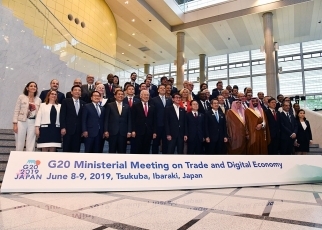
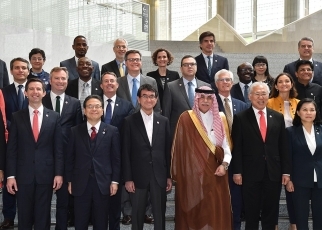
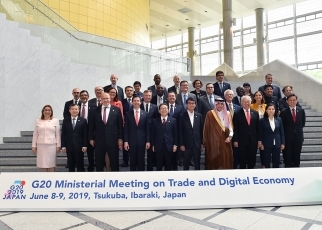
On June 8 to 9, Mr. Taro Kono, Minister for Foreign Affairs, attended the G20 Ministerial Meeting on Trade and Digital Economy held in Tsukuba City, Ibaraki Prefecture and co-chaired the meeting with Mr. Masatoshi Ishida, Minister for Internal Affairs and Communications, and Mr. Hiroshige Seko, Minister of Economy, Trade and Industry. The overview of the meeting is as follows.
In addition, a Ministerial Statement (PDF)  and Chairs’ Statement (PDF)
and Chairs’ Statement (PDF)  were adopted as outcomes of the meeting.
were adopted as outcomes of the meeting.
- 1. Attending Countries and Organizations
- 2. Overview of Digital Economy Session (June 8) (Co-Chaired by Minister Ishida and Minister Seko)
- 3. Overview of Joint Session (June 8) (Co-Chaired by Minister Kono, Minister Ishida, and Minister Seko)
- 4. Overview of Trade Session (June 9) (Co-Chaired by Minister Kono and Minister Seko)
- 5. Outcomes
- 6. Other
1. Attending Countries and Organizations
- (1) Ministers or representatives of the G20 member countries (Japan, United States, Canada, Mexico, Brazil, Argentina, EU, United Kingdom, Germany, France, Italy, Russia, Turkey, Saudi Arabia, South Africa, China, Republic of Korea, India, Indonesia, and Australia)
- (2) Ministers or representatives of other guest countries (nine countries: Spain, Singapore, Egypt [on behalf of AU], Senegal [on behalf of New Partnership for Africa’s Development (NEPAD)], Netherlands, Vietnam, Chili [on behalf of APEC], Nigeria [trade session only], and Estonia [digital economy session only])
- (3) Heads or representatives of guest international organizations (eight organizations: OECD, World Bank, IMF, WTO, United Nations Conference on Trade and Development [UNCTAD], International Trade Centre [ITC], International Telecommunication Union [ITU], and Economic Research Institute for ASEAN and East Asia [ERIA])
2. Overview of Digital Economy Session (June 8) (Co-Chaired by Minister Ishida and Minister Seko)
A discussion was held on the recent issues surrounding the digital economy, such as the concept of “data free flow with trust” proposed by Prime Minister Shinzo Abe in Davos in January 2019 and human-centered artificial intelligence (AI).
3. Overview of Joint Session (June 8) (Co-Chaired by Minister Kono, Minister Ishida, and Minister Seko)
- (1) In view of the advances in the digital economy, which have made it increasingly important for the G20 to cooperate on various issues, a discussion was held on the “interface between trade and the digital economy,” a cutting-edge issue of the international economy.
- (2) Minister Kono remarked in his opening address at this session that, in order to ensure the WTO continues to fully play its role as a cornerstone of the multilateral trading system, WTO rules need to adapt to the current reality that rapid progress of digitalization is fundamentally transforming the way international trade is conducted. In addition, Minister Kono stated that, from this perspective, great importance is attached to WTO initiatives on electronic commerce as an important element of the WTO reform endorsed by the G20 leaders in Buenos Aires last year, and that at the G20 Osaka Summit, the Government of Japan hopes political support will be provided to advance WTO rule-making on electronic commerce through the “Osaka Track.”
4. Overview of Trade Session (June 9) (Co-Chaired by Minister Kono and Minister Seko)
- (1) At Session 1 on the “current international trade situation” (chaired by Minister Kono), a majority of the countries expressed concerns over the negative impacts of the current international trade situation on the world economy. In addition, countries expressed views regarding the G20’s need to take steps to improve the trade and investment environment. A number of countries called for fighting against protectionism, including unfair trade practices. Many countries referred to the importance of the rules-based multilateral trading system and the need to mention and improve it.
- (2) At Session 3 on “promotion of trade and investment that contribute to sustainable and inclusive growth” (chaired by Minister Kono), the ministers shared the view that, taking into account how the benefits of trade and investment have not adequately reached all segments, it is necessary to sustain initiatives that encourage the participation of developing countries and micro, small, and medium-sized enterprises (MSMEs) in Global Value Chains. In addition, the ministers expressed support for the G20 to take note of the perspective of the B20. Insight was also shared among the G20 members on good practices for business and policies for achieving sustainable and inclusive growth through trade and investment. At Session 3, Minister Kono noted that many local foods from Ibaraki Prefecture are being served during this meeting, and that regrettably, foods from a number of prefectures including Ibaraki are subject to import restrictions even now, eight years after the Great East Japan Earthquake. In this regard, Minister Kono called on countries that maintain import restrictions on Japanese food products to lift their restrictions.
- (3) Furthermore, at Session 4 on “WTO reform and bilateral and regional trade agreements,” Minister Kono touched on especially the issue surrounding the Appellate Body, based on Japan’s position that we should progress WTO reform with a sense of urgency, and stated that it was important to discuss among all WTO Members the serious situation surrounding the functioning of the dispute settlement system.
5. Outcomes
- (1) Beneficial discussions took place through each session, and a substantive Ministerial Statement was adopted.
- (2) In particular, it was a significant achievement to reach an explicit agreement in the Ministerial Statement that action is necessary regarding the functioning of the dispute settlement system since Japan attaches importance to reforming it.
- (3) Regarding the importance of WTO reform included in last year’s G20 outcome document, the ministers were able to include a shared view in the Ministerial Statement that they will work constructively with other WTO Members to undertake WTO reform with a sense of urgency, including in the lead-up to the Twelfth WTO Ministerial Conference.
- (4) It was a significant achievement that the ministers in charge of trade and digital economy of the G20, which makes up over 80% of the world’s GDP, were able to unite and issue a strong message that will contribute to the Osaka Summit.
6. Other
On the margins of this meeting, Minister Kono held meetings with Dr. Cecilia Malmström, European Commissioner for Trade, the Rt Hon. Dr. Liam Fox MP, Secretary of State for International Trade of the United Kingdom, and Senator the Hon. Simon Birmingham, Minister for Trade, Tourism and Investment of Australia.


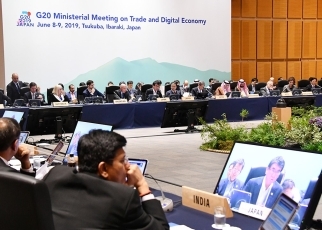
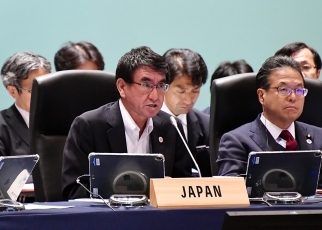
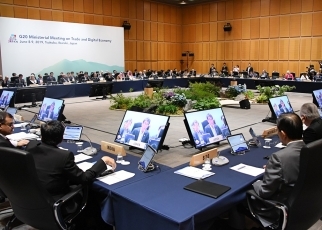
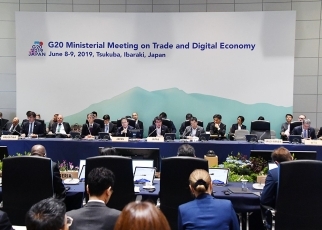
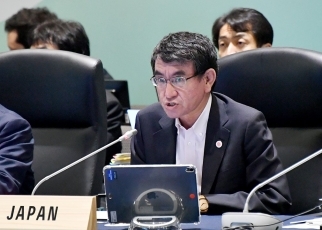
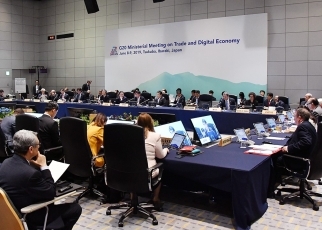
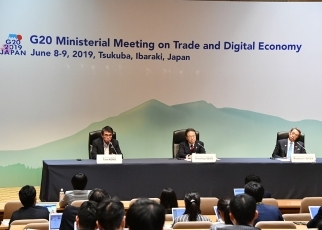
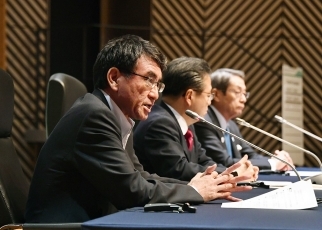
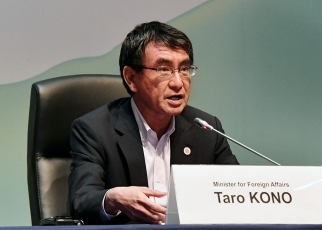
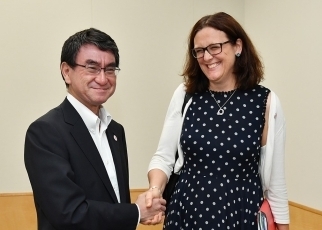
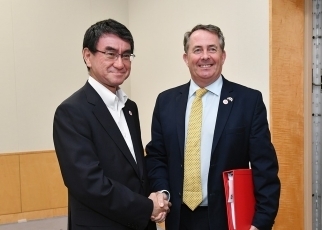
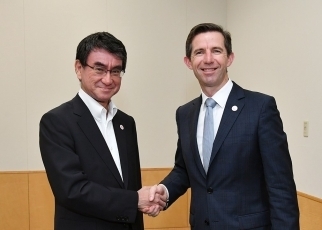
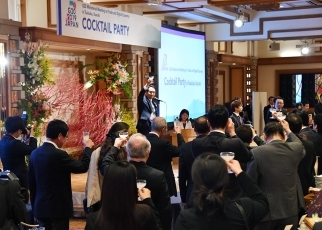
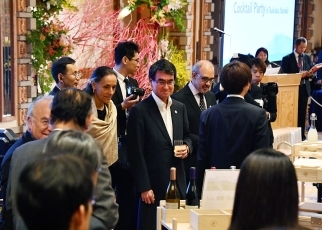
 (Open a New Window)
(Open a New Window)